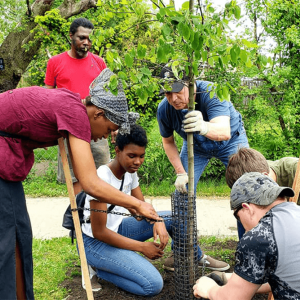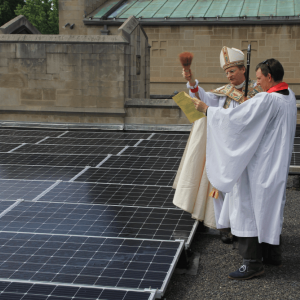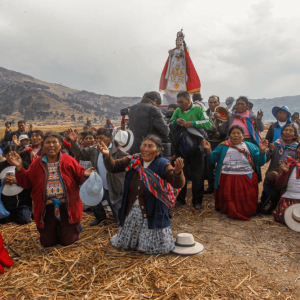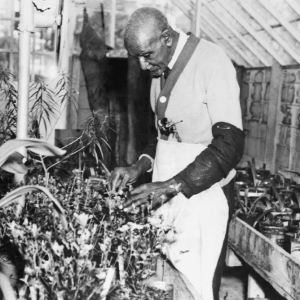
Rebecca Randall, an independent reporter and editor, is a Black and Korean U.S. domestic adoptee. Her first mother is an adoptee from South Korea. She writes on faith and the environment, psychology, and social inequities. She is the former science editor for Christianity Today.
Posts By This Author
Churches To Play Key Role in Spending $1 Billion Toward Climate Change
In a Cleveland neighborhood, a set of 25 young trees line the space between the sidewalk and the road. The trees were planted by volunteers from Calvary Reformed Church in 2019, an example of the types of actions that churches can take to address rising heat in their neighborhoods. Now, thanks to 2022’s Inflation Reduction Act, nearly $1 billion will fund similar projects across the nation.
Episcopal Church Approves Committee to Investigate Forced Adoptions
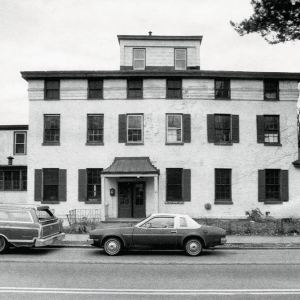
In the early 1970s, Francine Gurtler entered St. Faith’s Home for Unwed Mothers at the age of 14. St. Faith’s was located next door to Christ’s Church San Marco in Tarrytown, N.Y., and operated within the New York Diocese of the Episcopal Church. It transitioned into a children’s home in 1973 and is pictured here in the 1980s. Courtesy the Westchester County Historical Society.
The Episcopal Church’s executive council voted to form a committee to investigate the church’s involvement with forced adoptions that occurred between the 1940s and ’70s.
For Decades, Churches Forced Unwed Mothers Into Adoptions
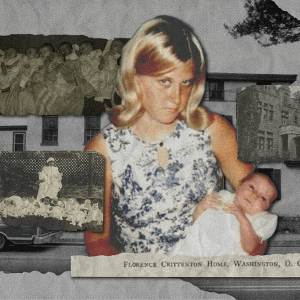
A collage of photos made by Tiarra Lucas/Sojourners. In center, Karen Wilson-Buterbaugh with her daughter at the Florence Crittenton Home in Washington, D.C., ten days after she was born on July 22, 1966. Courtesy Karen Wilson-Buterbaugh. Upper- and Bottom-left, photos of several babies in maternity homes (location unknown). Courtesy the Social Welfare History Archives, University of Minnesota Libraries. Background image, St. Faith’s House, in New York, in 1983. Courtesy Westchester County Historical Society.
When Francine Gurtler gave birth at age 15, she felt like she lost her voice. Gurtler lived at an Episcopal home for unwed mothers and said the workers of the home coerced her into placing her baby for adoption. “They literally took him from my arms,” she said. The adoption record notes she was “tearful,” but Gurtler said, “I was sobbing, hysterically, uncontrollably, on the ground begging the social worker to let me keep my baby.”
Can Churches Spread the Gospel of Solar in Coal Country?
In 2014, Shepherdstown Presbyterian Church in West Virginia installed an array of 60 solar panels with a scrappy financial model, hoping to lead by example and inspire other communities in Appalachia to transition to solar energy as well.
Do ‘Forest Funerals' — and Other Rituals — Help Climate Anxiety?
Rabbi Dean Shapiro recalls considering the future as he looked down at a baby’s head while giving her a Hebrew name and welcoming her into the covenant of Israel. She was born into a megadrought in Arizona that is only getting worse. As one infant after another is welcomed into his congregation, he finds himself reflecting on their future well-being amid a growing climate emergency. If this child spends her entire life in Phoenix, she could experience 146 days each year with a heat index topping 100 degrees by the time she reaches 30.
How Black History Can Inspire Climate Activism
Over his career, Luther Williams has seen the impact of racist education standards and a lack of Black representation in science.
The End of International Adoption?
EVANGELICALS AND OTHER Christians involved in adoption and “orphan care” ministries have often evoked Paul’s use of adoption as a metaphor: God “adopts” us into the family of God, so we should adopt children as a manifestation of the gospel.
But New Testament scholar Erin Heim, a U.S. domestic adoptee herself, has raised questions about Pauline adoption metaphors. “The thing that always gets said — ‘contemporary adoption is a horizontal expression of God’s vertical adoption of us’ — there’s something at face value that is a little bit comforting about it, but that doesn’t sit very well for very long,” Heim said in a podcast about her research on these metaphors.
Adoption by nature is a vertical relationship, Heim explained, referring to power inequities between parents and children and between cultures. “There’s no such thing as horizontal adoption,” she said. “When we make mini vertical things that [try to] look like what God does in the Bible, it’s idolatry.”
Christians were pioneers in the establishment of international adoption to the United States in the 1950s and later spurred an orphan care movement during the peak of international adoption in the early 2000s. Since 1948, roughly 1 million children globally have been placed in new families, far from their original families and culture, through intercountry adoption, according to demographer Peter Selman — more than 380,000 of them between 2000 and 2009.
While faith has guided Christians in promoting adoption, religious narratives also have upheld harmful power structures and practices. “White saviorism” and racial hierarchies have led to the separation of children from their cultures of origin. Adoptees who are now adults have shared stories of struggle within families and societies that deny or misunderstand these dynamics.
Earth Is in Trouble. Can Hymns Help?
The June release of a Climate Vigil The Porter’s Gate Worship Project aims to nudge Christians toward climate action, but it isn’t alone among contenders to inspire the climate movement. For over 20 years, Carolyn Winfrey Gillette, a Presbyterian minister from New York, has written hymns for the times, including one for the 2021 UN climate talks held in Scotland and several to recognize increasing natural disasters such as wildfires, hurricanes, and floods. Fossil Free PCUSA, a campaign within the Presbyterian Church (USA) has used hymns in protests, including songs by Christian artist Matthew Black.
